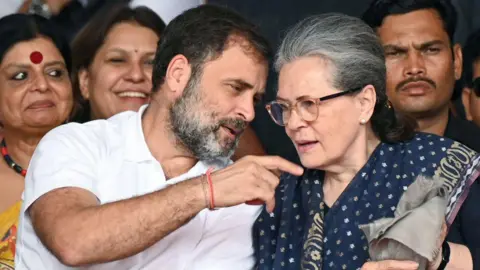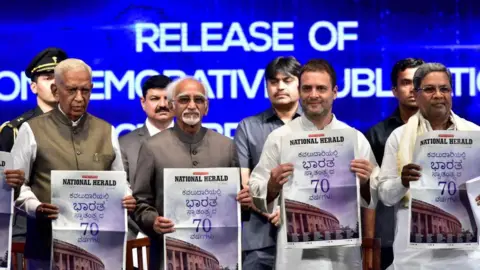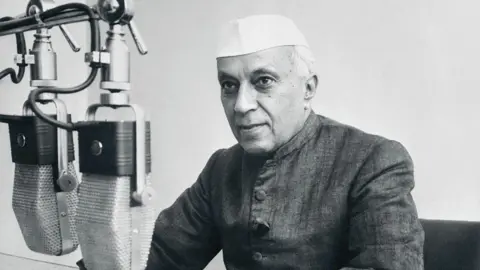India's Gandhis charged in money laundering case amid opposition outcry
 Getty Images
Getty ImagesIndia's opposition Congress party has said it will organise nationwide protests on Wednesday after the country's financial crimes agency charged senior leaders Sonia and Rahul Gandhi and others with money laundering.
The Enforcement Directorate (ED) presented its findings in a Delhi court on Tuesday, accusing the Gandhis of forming a shell company to illegally acquire assets of the National Herald newspaper worth more than 20bn rupees ($233mn; £176mn).
Congress spokesperson Jairam Ramesh called the charges "politics of vendetta and intimidation" by the government.
The Gandhis who have previously denied any wrongdoing have not commented on the charges.
 Getty Images
Getty ImagesThe investigation also names other members of the Congress party, including its overseas chief Sam Pitroda, according to news agency ANI.
The Enforcement Directorate (ED) began investigating the case in 2021 after a private complaint filed by Subramanian Swamy, a member of the governing Bharatiya Janata Party (BJP).
Swamy alleged that the Gandhis used party funds to take over Associated Journals Limited (AJL), which published the National Herald newspaper, and illegally acquired properties worth millions through AJL. The newspaper ceased operations in 2008 but was later relaunched as a digital publication.
The Congress maintains that it bailed out the publisher due to its historical legacy and had lent more than 900m rupees to AJL over the years.
In 2010, AJL became debt-free by swapping its debt for equity and assigning the shares to a newly created company called Young Indian, which the party says is a "not-for-profit company" with no dividends paid to its shareholders and directors.
Sonia and Rahul Gandhi are among Young Indian's directors and they each own 38% of the company. The remaining 24% is owned by Congress leaders, including Motilal Vora and Sam Pitroda.
Last week, the Enforcement Directorate said Young Indian had acquired AJL properties worth 20bn rupees for just 5m, significantly undervaluing their worth.
It also served several notices to seize assets worth 6.6bn rupees across several Indian cities - including Delhi and Mumbai - which are connected to Young Indian.
The case is scheduled to come up for hearing on 25 April.
In recent years, the opposition has repeatedly accused the Narendra Modi government of weaponising the Enforcement Directorate against its political opponents.
According to data compiled by Reuters in 2024, the agency has summoned, questioned or raided around 150 opposition politicians since Modi came to power in 2014.
Last year, the ED arrested former Delhi chief minister Arvind Kejriwal in connection with an alleged liquor scam just a month before key general elections. He spent five months in jail before being freed on bail.
 Getty Images
Getty ImagesWhat is the National Herald?
The National Herald newspaper was founded in 1938 by Jawaharlal Nehru, India's first prime minister and Rahul Gandhi's great-grandfather.
It ceased publication in 2008 after running into financial troubles but was later acquired by the Congress in 2010 and relaunched as a digital news outlet in 2016.
It was published by Associated Journals Limited (AJL), which was established in 1937 with 5,000 freedom fighters as shareholders. AJL also published Qaumi Awaz in Urdu and Navjeevan in Hindi.
The National Herald became known for its association with India's freedom struggle and its nationalist stance.
Nehru often wrote strong-worded columns, which led to the British government banning the paper in 1942. It reopened three years later.
After India gained independence in 1947, Nehru resigned as chairman of the newspaper to become prime minister.
But the Congress continued to play a huge role in shaping the newspaper's ideology.
In a message to the National Herald on its silver jubilee in 1963, Nehru spoke about the paper "generally favouring Congress policy" while maintaining "an independent outlook".
Over the years, the National Herald grew to be a leading English daily, supported by the Congress party, until it shut down in 2008 after years of financial troubles.
Follow BBC News India on Instagram, YouTube, Twitter and Facebook.
